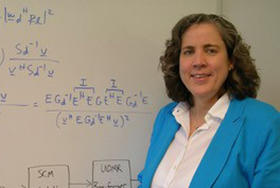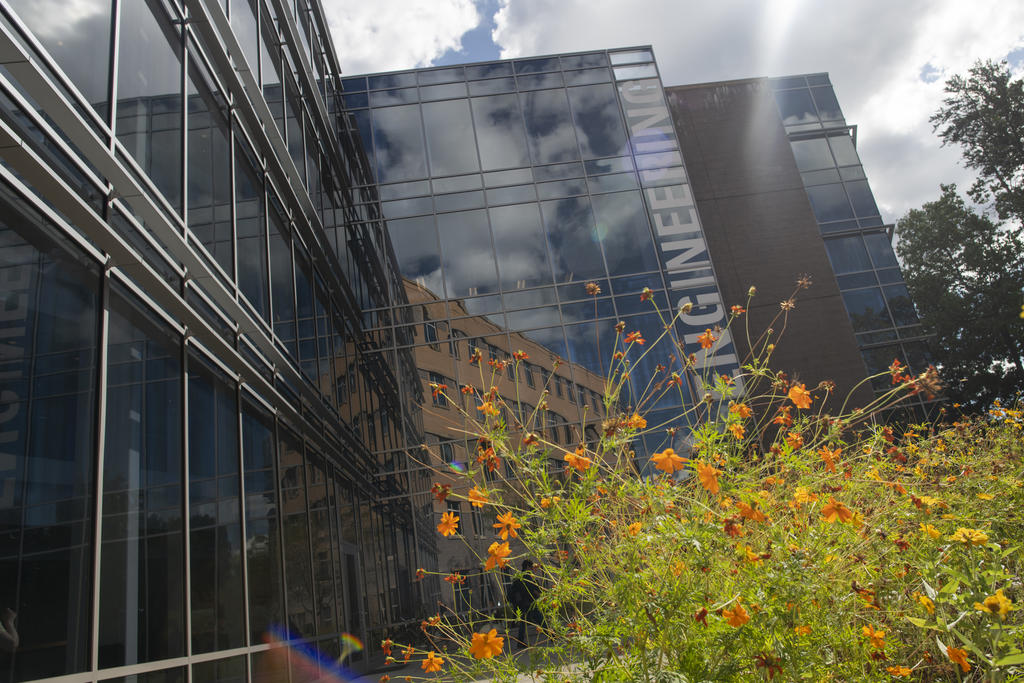
Our research labs have powerful computing platforms and the sophisticated equipment required to conduct experiments and create prototypes.

Matthew Thornton, a master's student in electrical engineering, used the Extended Kalman Filter to estimate daily infections of COVID-19.
Enhance your career options or enter a new field by developing the technical expertise to advance in industry, government, or academia.
Mason's Electrical and Computer Engineering Master’s programs provide a strong foundation in engineering analysis and design and emphasize hands-on experience. Project-oriented courses and labs give students access to modern tools widely used in the industry.
We offer a rich array of courses taught by full-time ECE faculty and adjunct faculty who bring industry expertise into the program. Students have the opportunity to work on topics of interest to them such as through an independent study, a research project, or a thesis under the guidance of our faculty. Students can choose either to specialize in one of the core areas that we offer or create a custom track that is appealing to them.
Our programs can be completed on a full-time or part-time basis. All graduate courses are offered during the evenings. We also offer several courses online.
In addition to our Master’s programs in the core areas of Electrical and Computer Engineering, we also offer Master’s programs in Digital Forensics and Telecommunications as well as graduate certificate programs.
MS in Electrical Engineering
In our Master of Science in Electrical Engineering program, our students learn how to design systems, devices, and algorithms that provide innovative solutions across a broad spectrum of ECE applications. They learn to create technological solutions that enable automation, high-speed communications, high-performance computing, advanced signal, and data analysis, and contribute to advances in space exploration and health-related products such as diagnostics, health monitoring, and prosthetics.
Students can choose to concentrate in one of the following areas (or create a custom specialization area) in which they can build theoretical foundations, develop analytical capabilities and gain practical hands-on skills:
- Bioengineering
- Communications and Networking
- Controls and Robotics
- Electronics
- Machine Learning in Electrical Engineering
- Power Systems and Smart Grid
- Signal Processing
- Space-Based Systems
In addition to coursework selected in consultation with a faculty advisor in the form of a plan of study, the program also requires attendance in seminars listed on our events page. Students are provided the option to complete either a master’s thesis or scholarly paper (through select coursework).
For more information, email our department or call 703-993-1569.
MS in Computer Engineering
In our Master of Science in Computer Engineering program, our students learn how to design new generations of computers, as well as embedded computing systems, such as those found in smartphones, cars, appliances, computer networks, smart factories, and the internet-of-things. The program covers the entire digital integrated circuit design process targeting Field Programmable Gate Arrays (FPGAs) and Application Specific Integrated Circuits (ASICs), using various optimization criteria, such as speed, cost, power, and energy, reliability, and security. It also encompasses the complete software development process targeting microcontrollers, microprocessors, multi-cores, and Graphics Processing Units (GPUs). It teaches students how to efficiently partition the system into software and hardware components, and develop high-performance interfaces between these two parts.
Students can choose to concentrate in one of the following areas (or create a custom specialization area) in which they can build theoretical foundations, develop analytical capabilities and gain practical hands-on skills:
- Computer Architecture and Embedded Systems
- Computer Networks
- Digital Signal Processing
- Digital System Design
- Hardware Security and Cryptographic Engineering
- Internet of Things and Network Security
- Machine Learning and Intelligent Computer Architectures
- Space-Based Systems
In addition to coursework selected in consultation with a faculty advisor in the form of a plan of study, the program also requires attendance in seminars available through our seminars page. Students are provided the option to complete either a master’s thesis or scholarly paper (through select courses).
For more information, email our department or call 703-993-1569.
MS in Digital Forensics
Digital forensics is a discipline addressing the collection, processing, and analysis of digital data for the purpose of verifying/validating the existence of an event of investigative, intelligence, cyber, or business interest. Our Master of Science in Digital Forensics program prepares graduates for a wide variety of careers including law enforcement, various other branches of government, incident response, and all facets of cyber security. This is achieved by combining academic education with real-world practical techniques and by offering advanced training in analyzing digital evidence, intrusion forensics, reverse engineering, network analysis, and legal and ethical matters.
For more information, visit the MS in Digital Forensics main program webpage. You may also call 703-993-3810 or email with additional questions.
MS in Telecommunications
The interdisciplinary Master of Science in Telecommunications degree offers a blend of cutting-edge practice-oriented courses in cloud computing, network engineering, wireless communications, and network security. This industry-oriented program is designed for students who wish to enter the field of telecommunications or are working in the field and want to advance their knowledge of telecommunications. The program concentrates on practical applications of telecommunications, rather than on a theoretical approach while providing a thorough education in the necessary engineering principles. Hands-on laboratory courses provide students with practical skills and knowledge needed to hit the ground running after graduation.
This program also offers two certificate programs that may be incorporated into and taken concurrently with, the MS in Telecommunications.
For more information, visit the MS in Telecommunications main program webpage. You may also call 703-993-3810 or email with additional questions.
